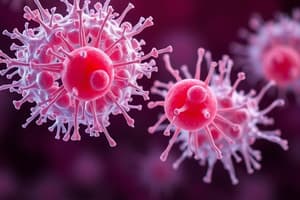Podcast
Questions and Answers
What are potential complications of diabetes mellitus type 1?
What are potential complications of diabetes mellitus type 1?
- Hyperthyroidism, heart failure, osteoporosis
- Asthma, allergies, eczema
- Neuropathy, retinopathy, nephropathy (correct)
- Obesity, hypertension, chronic fatigue syndrome
Which condition is characterized by frequent hypoglycemia and diabetic ketoacidosis (DKA)?
Which condition is characterized by frequent hypoglycemia and diabetic ketoacidosis (DKA)?
- Gestational Diabetes
- Type 2 Diabetes Mellitus
- Brittle Diabetes Mellitus (correct)
- Latent Autoimmune Diabetes in Adults (LADA)
In a liver transplant, where is the ideal surgical position located?
In a liver transplant, where is the ideal surgical position located?
- Left Thoracic Cavity
- Right Iliac Fossa (correct)
- Upper Abdomen
- Lower Pelvic Area
Which of the following is a contraindication for pancreatic procedures?
Which of the following is a contraindication for pancreatic procedures?
What condition requires an intestine transplant in conjunction with total parenteral nutrition (TPN) failure?
What condition requires an intestine transplant in conjunction with total parenteral nutrition (TPN) failure?
Which structures are divided during a hepatectomy?
Which structures are divided during a hepatectomy?
Which of the following conditions could lead to pancreatic complications and warrant caution during procedures?
Which of the following conditions could lead to pancreatic complications and warrant caution during procedures?
What type of incision is commonly used for recipient operations in transplants?
What type of incision is commonly used for recipient operations in transplants?
What is the primary mechanism leading to graft damage in humoral rejection?
What is the primary mechanism leading to graft damage in humoral rejection?
What is the expected consequence of hyperacute rejection?
What is the expected consequence of hyperacute rejection?
What major event is activated due to antibody binding in humoral rejection?
What major event is activated due to antibody binding in humoral rejection?
Which type of host is involved in graft versus host disease?
Which type of host is involved in graft versus host disease?
What is crucial in preventing hyperacute rejection?
What is crucial in preventing hyperacute rejection?
What characterizes the immune response in host versus graft rejection?
What characterizes the immune response in host versus graft rejection?
How does a graft versus host scenario arise?
How does a graft versus host scenario arise?
What is the end result of both types of rejection?
What is the end result of both types of rejection?
Which of the following is NOT true for Class III MHC?
Which of the following is NOT true for Class III MHC?
What defines xenotransplantation?
What defines xenotransplantation?
Which statement correctly describes autotransplantation?
Which statement correctly describes autotransplantation?
What is the primary mechanism of damage in humoral rejection?
What is the primary mechanism of damage in humoral rejection?
Which of the following is a contraindication for kidney transplant?
Which of the following is a contraindication for kidney transplant?
What type of transplant is an orthotopic procedure?
What type of transplant is an orthotopic procedure?
Which procedure does NOT require immunosuppression?
Which procedure does NOT require immunosuppression?
What is the most significant factor in determining compatibility for organ transplantation?
What is the most significant factor in determining compatibility for organ transplantation?
What is the ideal recipient position for kidney transplant HLA molecules?
What is the ideal recipient position for kidney transplant HLA molecules?
Which of the following signs is NOT a warning sign of liver transplant rejection?
Which of the following signs is NOT a warning sign of liver transplant rejection?
Which irreversible liver disease is NOT an indication for liver transplant?
Which irreversible liver disease is NOT an indication for liver transplant?
Which type of clinical rejection is caused by preformed antibodies against the donor's HLA?
Which type of clinical rejection is caused by preformed antibodies against the donor's HLA?
What is TRUE about chronic clinical rejection?
What is TRUE about chronic clinical rejection?
Which of the following is a contraindication for pancreatic transplant?
Which of the following is a contraindication for pancreatic transplant?
Which of the following options is associated with acute rejection?
Which of the following options is associated with acute rejection?
Which condition is most directly related to hyperacute rejection?
Which condition is most directly related to hyperacute rejection?
What is the ideal relationship for an organ donor to maximally reduce the risk of rejection?
What is the ideal relationship for an organ donor to maximally reduce the risk of rejection?
Which of the following is critical to ensure before organ transplantation?
Which of the following is critical to ensure before organ transplantation?
When is antibacterial prophylaxis typically administered during an immunosuppression regimen?
When is antibacterial prophylaxis typically administered during an immunosuppression regimen?
What is the most common organ transplanted worldwide?
What is the most common organ transplanted worldwide?
Which condition is NOT typically an indication for small bowel transplantation?
Which condition is NOT typically an indication for small bowel transplantation?
What percentage chance of success is indicated for a transplantation from a haplotype matched sibling?
What percentage chance of success is indicated for a transplantation from a haplotype matched sibling?
Which type of graft involves genetically identical members of the same species?
Which type of graft involves genetically identical members of the same species?
Which of the following is NOT a common comorbidity affecting transplant success?
Which of the following is NOT a common comorbidity affecting transplant success?
What is the primary reason for the rejection of transplants in genetically nonidentical persons?
What is the primary reason for the rejection of transplants in genetically nonidentical persons?
Which type of transplantation involves grafting an organ to a different anatomical location?
Which type of transplantation involves grafting an organ to a different anatomical location?
What type of immune component is primarily responsible for cellular rejection of transplanted organs?
What type of immune component is primarily responsible for cellular rejection of transplanted organs?
Which transplantation type does NOT require immunosuppression due to immunological similarity between donor and recipient?
Which transplantation type does NOT require immunosuppression due to immunological similarity between donor and recipient?
What is the function of HLA antigens in the immune response?
What is the function of HLA antigens in the immune response?
Which class of human leukocyte antigen is expressed by all nucleated cells?
Which class of human leukocyte antigen is expressed by all nucleated cells?
What defines heterotopic transplantation?
What defines heterotopic transplantation?
What is typically required when performing an allotransplantation?
What is typically required when performing an allotransplantation?
Which organ system is primarily responsible for the biological recognition and immune response to transplanted tissues?
Which organ system is primarily responsible for the biological recognition and immune response to transplanted tissues?
What is the potential outcome when transplants are performed without understanding immunologic processes?
What is the potential outcome when transplants are performed without understanding immunologic processes?
Which cellular defense is generally the first line of defense against pathogens during organ transplantation?
Which cellular defense is generally the first line of defense against pathogens during organ transplantation?
In which organ transplantation type is the diseased organ maintained in place?
In which organ transplantation type is the diseased organ maintained in place?
What future experimental type of transplantation involves transferring tissue from animals to humans?
What future experimental type of transplantation involves transferring tissue from animals to humans?
Which cellular process predominantly triggers the rejection of transplanted organs?
Which cellular process predominantly triggers the rejection of transplanted organs?
Flashcards
Transplantation
Transplantation
The process of transferring an organ, tissue, or cell from one location to another.
Organ Transplantation
Organ Transplantation
A surgical procedure where a failing organ is replaced with a functioning one.
Orthotopic Transplantation
Orthotopic Transplantation
The transplanted organ is placed in the SAME anatomical location in the recipient as it was in the donor.
Heterotopic Transplantation
Heterotopic Transplantation
Signup and view all the flashcards
Heterotopic Transplantation
Heterotopic Transplantation
Signup and view all the flashcards
Autotransplant
Autotransplant
Signup and view all the flashcards
Allograft
Allograft
Signup and view all the flashcards
Xenotransplant
Xenotransplant
Signup and view all the flashcards
Immune System
Immune System
Signup and view all the flashcards
First Line of Defense
First Line of Defense
Signup and view all the flashcards
Second Line of Defense
Second Line of Defense
Signup and view all the flashcards
Third Line of Defense
Third Line of Defense
Signup and view all the flashcards
Major Histocompatibility Complex (MHC)
Major Histocompatibility Complex (MHC)
Signup and view all the flashcards
Human Leukocyte Antigen (HLA)
Human Leukocyte Antigen (HLA)
Signup and view all the flashcards
Graft Rejection
Graft Rejection
Signup and view all the flashcards
Hyperacute Rejection
Hyperacute Rejection
Signup and view all the flashcards
Host vs. Graft Rejection
Host vs. Graft Rejection
Signup and view all the flashcards
Graft vs. Host Rejection
Graft vs. Host Rejection
Signup and view all the flashcards
HLA Molecules
HLA Molecules
Signup and view all the flashcards
HLA Typing
HLA Typing
Signup and view all the flashcards
Cross-Matching
Cross-Matching
Signup and view all the flashcards
Pre-transplant Blood Typing
Pre-transplant Blood Typing
Signup and view all the flashcards
Brittle Diabetes
Brittle Diabetes
Signup and view all the flashcards
Hepatectomy
Hepatectomy
Signup and view all the flashcards
Orthotopic Transplant
Orthotopic Transplant
Signup and view all the flashcards
Vascular Anastomosis
Vascular Anastomosis
Signup and view all the flashcards
CHA Anastomosis
CHA Anastomosis
Signup and view all the flashcards
Infrahepatic Vena Caval Anastomosis
Infrahepatic Vena Caval Anastomosis
Signup and view all the flashcards
Suprahepatic Vena Caval Anastomosis
Suprahepatic Vena Caval Anastomosis
Signup and view all the flashcards
Autotransplantation
Autotransplantation
Signup and view all the flashcards
Bilateral Subcostal Incision with Midline Extension
Bilateral Subcostal Incision with Midline Extension
Signup and view all the flashcards
Allotransplantation
Allotransplantation
Signup and view all the flashcards
Humoral Rejection
Humoral Rejection
Signup and view all the flashcards
Contraindications for Kidney Transplant
Contraindications for Kidney Transplant
Signup and view all the flashcards
MHC
MHC
Signup and view all the flashcards
Antigen Presenting Cells
Antigen Presenting Cells
Signup and view all the flashcards
T-Lymphocytes
T-Lymphocytes
Signup and view all the flashcards
Allograft Rejection
Allograft Rejection
Signup and view all the flashcards
Syngeneic transplantation
Syngeneic transplantation
Signup and view all the flashcards
Kidney Transplant
Kidney Transplant
Signup and view all the flashcards
Where is a kidney transplant placed?
Where is a kidney transplant placed?
Signup and view all the flashcards
What is hyperacute rejection?
What is hyperacute rejection?
Signup and view all the flashcards
What is hyperacute rejection caused by?
What is hyperacute rejection caused by?
Signup and view all the flashcards
What is acute rejection?
What is acute rejection?
Signup and view all the flashcards
What is chronic rejection?
What is chronic rejection?
Signup and view all the flashcards
Which irreversible liver disease isn't a reason for a liver transplant?
Which irreversible liver disease isn't a reason for a liver transplant?
Signup and view all the flashcards
What is a contraindication for a pancreatic transplant?
What is a contraindication for a pancreatic transplant?
Signup and view all the flashcards
Which of the following is NOT a warning sign of liver transplant rejection?
Which of the following is NOT a warning sign of liver transplant rejection?
Signup and view all the flashcards
Study Notes
Transplantations
- Definition of Transplantation: The process of transferring an organ, tissue, or cell from one location to another.
- Types of Transplantation:
- Autotransplant: Transfer from one part of the body to another in the same person (e.g., skin grafts)
- Allotransplant: Transfer between individuals of the same species (e.g., kidney transplant between humans)
- Xenotransplant: Transfer between different species (e.g., animal to human transplants - usually experimental)
- Host Defenses: First lines of defense are chemical and physical barriers (e.g., skin). Second line is the internal cellular defenses. Third line includes the immune response system that attacks and destroys foreign bodies.
- Major Histocompatibility Complex (MHC): (Human Leukocyte Antigen [HLA] system in humans). These antigens are markers on cells that the recipient's immune system recognizes as foreign prompting rejection.
- Graft Rejection: The body's immune system recognizing the transplanted organ as foreign and attacking it. This can happen in various ways (hyperacute, acute, and chronic).
- Immunosuppression: Treatment to suppress the immune system, preventing rejection of a transplanted organ.
- Kidney Transplant: A common transplant, often involving deceased donors.
- Liver Transplant: Significant surgical procedure with significant risk and high potential for success.
- Small Bowel Transplant: Used for patients with irreversible intestinal failure.
Clinical Rejection
- Host vs Graft: Rejection caused by the immunocompetent host recognizing foreign antigens, triggering an immune response and organ rejection.
- Graft vs Host: Caused by immunocompromised host, recipient receiving immunocompetent cells that recognize the host as foreign.
- Hyperacute Rejection: Rapid, irreversible rejection of the transplanted tissue that occurs within minutes to hours. Often caused by preformed antibodies in the recipient.
- Acute Rejection: Occurs within days to weeks post-transplant, triggered by immune response to graft antigens.
- Chronic Rejection: Gradual and progressive rejection that occurs over months or years. It is often linked to irreversible tissue damage.
Other factors
- Donor Selection: Critical for success, matching donor HLA type with patient.
- Organ Procurement and preservation: Key for a successful transplant. Ensuring optimal organ function during the process, maintaining good conditions to the organ to ensure success.
- Immunosuppression: Crucial to prevent rejection. Drugs, such as corticosteroids, calcineurin inhibitors, and others, are used.
- Clinical Evaluation and Preparation: Pre and post-operative evaluation essential for assessing and minimizing organ risk prior and after transplant.
- Kidney disease: A significant indication for kidney transplantation.
- Liver Disease: A significant indication for liver transplantation.
- Small Bowel Transplant: An option for individuals with severe small bowel disease. This results from irreversible intestinal failure in combination with TPN failure, where the intestine cannot function appropriately.
- Pancreas Transplant: This is an option for individuals with insulin-dependent diabetes (IDDM) (Type 1 diabetes). This procedure results in normalization or improvement of glucose homeostasis, with a reduced risk of hypoglycemia and prevention or reversal of long term diabetes associated complications.
Studying That Suits You
Use AI to generate personalized quizzes and flashcards to suit your learning preferences.
Related Documents
Description
Test your knowledge on diabetes mellitus type 1 complications and the intricacies of organ transplant procedures. This quiz covers essential aspects such as hypoglycemia, graft rejections, and surgical techniques relevant to managing these conditions. Perfect for healthcare students and professionals seeking to deepen their understanding.





